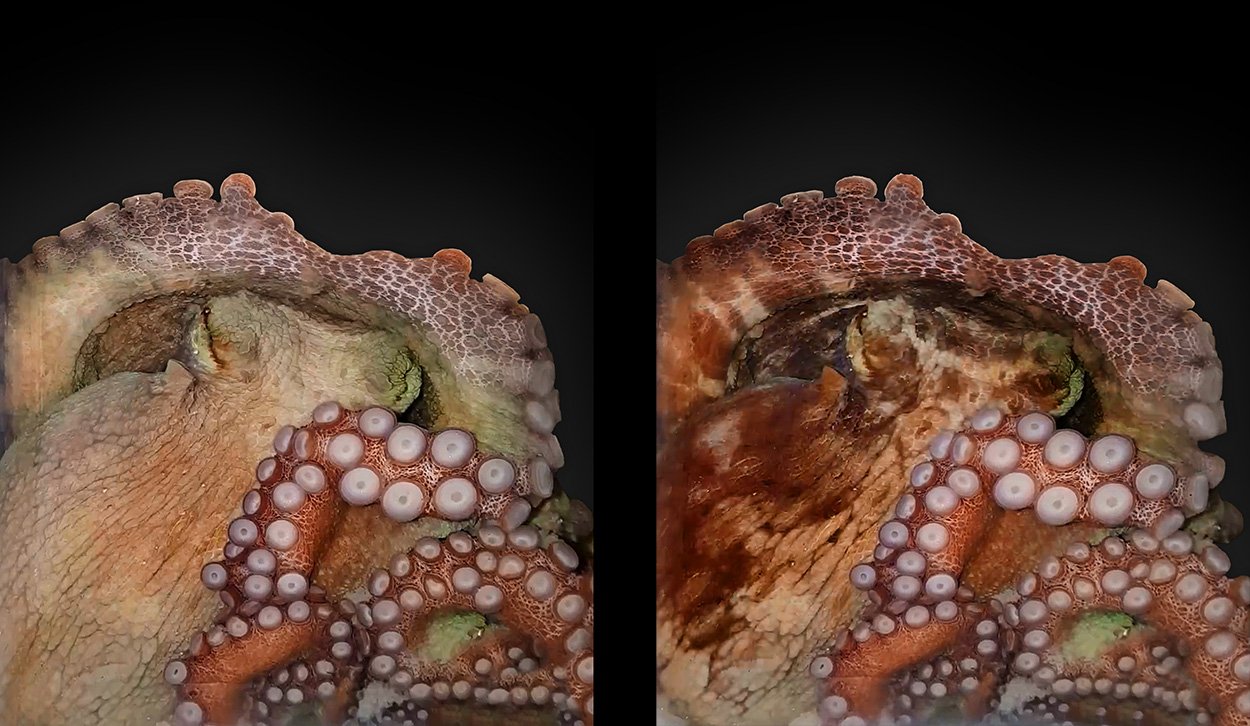
Octopuses have two alternating stages of sleep
Most of the time, when an octopus sleeps, its skin is pale and the muscles relax. However, from time to time, the animal begins to twitch, tighten the suction cup, move its eyes and change color. An explanation for this is now being presented in a new study, according to which eight cephalopods have active and passive sleep stages that alternate periodically – similar to humans. In the researchers’ view, it is reasonable for octopuses to dream during active sleep stages. The result is also interesting for sleep development.
Pet owners can occasionally see their four-legged friend move their paws or make noises while they sleep. It has also been shown that birds and reptiles have what is known as REM sleep, which are the stages in which people dream the most. This stage is named after typical rapid eye movement. Studies in animals and humans show that REM sleep is linked to learning processes and can play a role in managing stress.
Less exciting to sleep
Researchers led by Silvia Medeiros of the Federal University of Rio Grande do Norte in Brazil have now used video notes on four octopuses to demonstrate that they also go through alternating sleep phases: For most of their sleep, octopuses are pale in color and largely immobile. However, they change color and muscle tone on the body and the suction cups shrink. Researchers report that increased eye movements may also be observed during this stage.
In order to verify that these active stages are actually sleep and that the octopus doesn’t just wake up every now and then, the researchers presented them with visual stimuli: On a computer screen next to the aquarium, they played videos of crabs – one of their favorite foods – for them. If the octopuses were awake, they were interested in the video, and if they fell asleep on the other hand, they showed no reaction or drastically delayed reaction. In the case of the octopus, who was not excited by the video even when awake, the researchers instead knocked on the pool with increasing intensity. Here, too, it has been found that when an octopus sleeps, it needs stronger stimuli before it can react. This was more true for the active sleep stages than the passive stages. It seems he was actually sleeping.
What does octopus dream about?
“What makes it more interesting is that this ‘active sleep’ usually occurs after a long ‘quiet’ sleep – longer than six minutes overall – and that it has a distinct frequency,” says Medeiro Siddharta Ribeiro’s colleague. According to the researchers’ observations, the cycle is repeated approximately every 30 to 40 minutes. Active sleep phases are usually very short – usually from a few seconds to a minute. Based on the results of REM sleep in humans and different vertebrates, researchers speculate that octopuses experience something similar to REM sleep during active sleep.
“It is not possible to confirm that they are dreaming because they cannot tell us, but our results indicate that during” active sleep “octopuses may go through a state similar to REM sleep, which is the state in which people dream more than others,” Medeiros says. As for the content of dreams of octopuses, she says: “If octopuses do dream, they are unlikely to go through complex symbolic actions like us.” And the active sleep stages are too short for that. “If people ever dream about this situation, they tend to be in the form of small videos or even gifs,” Medeiros says.
A new look at the evolution of sleep
The discovery that octopuses have different stages of sleep and possibly even dreams sheds new light on sleep development. “The change in sleep we observed in octopuses appears to be very similar to ours,” Medeiros says, “despite the tremendous evolutionary distance between cephalopods and vertebrates.” Given that the evolutionary lineages of octopuses and humans separated about 500 million years ago, it seems unlikely that the different stages of sleep dated back to their last common ancestors.
Medeiros says: “If different sleep states actually evolve twice independently of one another in vertebrates and invertebrates, then the question arises: What are the primary evolutionary driving forces that shape this physiological process?” “The independent development of active sleep in cephalopods similar to REM sleep in vertebrates could reflect a characteristic common to all central nervous systems that reach a certain level of complexity.”
In future studies, researchers want to record neurological data from cephalopods to better understand what is happening while they sleep. They also want to clarify the role that sleep plays in animals’ metabolism, thinking and learning. “It is tempting to speculate that dreaming in octopuses, just as it is with humans, can help adapt to environmental challenges and encourage learning,” says Ribeiro.
Coyle: Silvia Medeiros (Federal University of Rio Grande do Norte) et al., IScience, Doi: 10.1016 / j.isci.2021.102223

“Organizer. Social media geek. General communicator. Bacon scholar. Proud pop culture trailblazer.”
